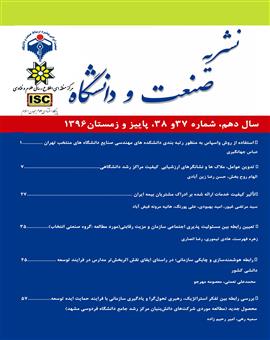تدوین عوامل، ملاک ها و نشانگرهای ارزشیابی کیفیت مراکز رشد دانشگاهی
محورهای موضوعی : تخصصیالهام روح بخش 1 * , حسن رضا زین آبادی 2
1 - دانشگاه خوارزمی
2 - گروه مدیریت آموزشی، دانشکده مدیریت، دانشگاه خوارزمی، تهران، ایران
کلید واژه: عوامل, ملاکها, نشانگرها, مراکز رشد دانشگاهی,
چکیده مقاله :
این دیدگاه وجود دارد که دانشگاهها از طریق انتقال تکنولوژی باعث توسعه اقتصادی میشوند. ایجاد و گسترش مراکز رشد کسب وکار، بحثهای بیشماری در زمینه عملکرد آنها و مفید بودن آنها به عنوان ابزاری برای تشویق ایجاد کسب وکاری جدید و مشاغل، توسعه اقتصاد محلی و منطقهای، تولید ثروت فردی و اجتماعی میان موافقان و مخالفان به راه انداخته است ]1[. با توجه به رشد، اهمیت و تاثیر مراکز رشد دانشگاهی در توسعهی اقتصادی از طریق ایجاد ارتباط بین دانشگاه و صنعت، هدف اصلی پژوهش حاضر تدوین عوامل، ملاک ها و نشانگرهایی میباشد که در ارزشیابی کیفیت مراکز رشد دانشگاهی به کار گرفته شود. این پژوهش با استفاده از روش پیمایشی صورت گرفته و ابزار آن مصاحبه است. بدین ترتیب با 15 نفر از افراد خبره و کارشناس در زمینهی مراکز رشد دانشگاهی و ارزشیابی، مصاحبه صورت گرفت. همچنین مقالهها و پژوهشهایی که در تدوین شاخصهای ارزشیابی مراکز رشد تلاشهایی انجام داده بودند در جهت تکمیل این پژوهش مورد استفاده قرار گرفت. دادههای حاصل از مصاحبه با استفاده از روش کدگذاری باز، محوری و انتخابی، تجزیه و تحلیل شدهاند. یافتههای پژوهش در قالب 9 عامل طبقهبندی شده است. هر عامل شامل تعدادی ملاک میباشد که در مجموع 32 ملاک ایجاد شد و هرکدام از این ملاکها شامل تعدادی نشانگر میباشد که در مجموع 237 نشانگر استخراج شد. در این پژوهش سعی شد با توجه به پژوهش ها داخلی و خارجی انجام شده در زمینه ارزشیابی و تدوین معیارهای ارزشیابی، مجمو عه ای تدوین شود که از جامعیت بیشتری برخوردار باشد.
There is a opinion that universities are driving economic development through technology transfer. Establishment and expansion of business Incubator, Countless discussions about their performance and their usefulness as a means of encouraging the creation of new businesses and jobs, the development of local and regional economies, the production of personal and social wealth among the proponents And the opposition has launched [1]. Considering the growth, significance and impact of university incubators economic development through the establishment of the relationship between university and industry, the main goal of the present study is to develop factors, criteria and indicators used in evaluating the quality of the university incubators. This research was conducted using survey method and interview tools. Thus, with 15 experts and connoisseurs in the field of university incubators and assessment were interviewed. Also, the articles and researches that were done in developing the evaluation indexes of the centers of growth were used to complete this research. The interview data were analyzed using open, axial and selective coding methodology. The research findings are categorized into 9 factors. Each factor consists of a number of criteria, of which a total of 32 criteria were created, and each of these criteria included a number of markers, with a total of 237 markers extracted. This study was tried due to internal and external research done In the field of evaluation and Compiling of evaluation criteria, Composition is compiled Which is more comprehensive.
1. Eshun, J. P. Where do business incubators come from, Doctoral dissertation, Columbia University, 2004.
2. Chieh Chang, Y., Hua, M., Chen, M.H. and Yang, P, “Factors Influencing Academic Entrepreneurship: The Case of Taiwan. Innovation and Technology Program”, Taiwan: Department of Business Administration, Yuan-ZE University & Institute of International Business Studies, National Chi Nan University, available from: www. rnd.ncnu. edu.tw, 2005.
3. رادمنش، سید علیرضا، طباطبائیان، سیدحبیب الله و فراهانی بورقانی، سهیلا، دانشگاه کارآفرین و ضرورت توجه به آن در الگوی اسلامی-ایرانی پیشرفت، پنجمین کنفرانس الگوی اسلامی ایرانی پیشرفت، 1395 .
4. پور تیموری فرد تبریزی و جمشیدی، لاله، بررسی عملکرد نوآورانه شرکت های دانش بنیان مستقر در مرکز رشد علم و فن آوری دانشگاه سمنان، نشریه صنعت و دانشگاه، شماره¬ی 23و 24، ص37-51، بهمن 1393.
5. فرجی، علیرضا، الگویی برای مراکز رشد دانشگاهی، مجله رویش، شماره5، ص 5-10، 13
6. Albot-Morant,Gema, Oghazi, pejvak, How useful are incubators for new entrepreneurs,Journal of Business Research, Issue 6, pp.2125-2129, June 2016.
7. Wonglimpiyarat,Jarunee,Technolo-gy auditing and risk management of technology incubators/ science parks, World Journal of Entrepreneurship, Managementand Sustainable Development, 2017.
8. فراستخواه، مقصود، بررسی فرآیند نهادینه شدن ساختار ارزیابی درونی و بیرونی در آموزش عالی ایران؛ با تاکید بر نظریهی ساختاریابی، پنجمين همايش" ارزيابي كيفيت در نظام دانشگاهي"- دانشگاه تهران - پرديس دانشكدههاي فني، 1390.
9. آقاجانی، حسنعلی و طالب نژاد، عاطفه، ارائه چارچوبی برای ارزیابی مراکزرشد، فصلنامه تخصصی پارک ها و مراکز رشد، شماره 19، 1388.
10. Campell, c. and D. N. Allen. The small BusinessincubatorIndustry: Microleve EconomicDevelopment.economicDevelopment Quaterlyl (2) :pp. 178 -191, 1987.
11. Allen, D.N. and M.L. Weinberg, 'State Investment in Business Incubators,' Public Administration Quarterly 12 (2), pp.196-215, 1988.
12. Albert, P, Gaynor, L, Incubators: growing up, moving out - a review of the literature, Cahiers de Recherche, Arpent, 2001.
13. صفری، سارا و مداح، معصومه، استفاده از کارت امتیازی متوازن به منظور ارزیابی عملکرد مراکز رشد، فصلنامه تخصصی پارک ها و مراکز رشد، 1385.
Saidi-Mehrabad, M, Rezaei Sadrabadi, 14. M, and Mohammadian, I , A new method to fuzzy modeling and its application in performance evaluation of tenants incubators, Int AdvManuf Technol,37,pp.191-201,2008.

